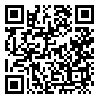Volume 8, Issue 31 (2011)
LIRE 2011, 8(31): 33-50 |
Back to browse issues page
Download citation:
BibTeX | RIS | EndNote | Medlars | ProCite | Reference Manager | RefWorks
Send citation to:



BibTeX | RIS | EndNote | Medlars | ProCite | Reference Manager | RefWorks
Send citation to:
An Analysis of Poems of Hafez Shirazi: Based on Car Gustav Jung’s Shadow & Mask Theory. LIRE 2011; 8 (31) :33-50
URL: http://lire.modares.ac.ir/article-41-37809-en.html
URL: http://lire.modares.ac.ir/article-41-37809-en.html
Abstract: (3083 Views)
Aliakbar Bagheri Khalili, PH.D.
Manireh Mehrabi Kali
Abstract
From the perspective of Carl Gustav Jung (1875-1961 AD), the collective unconscious, is the source of historical experiences and these experiences are manifested through ancient patterns. Mask, shadow, anima, animos and self/mandala, are the most ancient patterns which are also manifested in literary works. Jung believes that the ancient patterns very effective in the formation and evolution of personality. According to this theory, contrasts and conflicts of personality types and social classes in the poems of Hafez are compatible to mask and shadow of Jung and dictums such as spoiled and distinctness are responsible to define the opposition of shadow mask are responsible. The most important masks of Khawaja Shams al-Din Muhammad are: guardian and, pious. In these shadows, Khawaja shows himself less than what it is, so that there is no or less than what will happen. It has been an attempt to achieve balance, follow through to perfection. In this way, he constructs "I", “mask” and “shadow” bring the unity of the personality of "knavish".
Article Type: مقالات علمی پژوهشی |
Subject:
Hafez
Received: 2019/10/28 | Accepted: 2019/10/28 | Published: 2019/10/28
Received: 2019/10/28 | Accepted: 2019/10/28 | Published: 2019/10/28
| Rights and permissions | |
 |
This work is licensed under a Creative Commons Attribution-NonCommercial 4.0 International License. |






